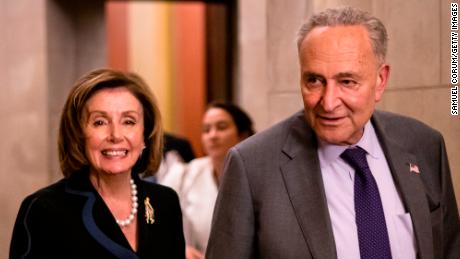“Nobody elected him to be F.D.R.,” Rep. Abigail Spanberger of Virginia, who faces a tough reelection battle, told The New York Times. “They elected him to be normal and stop the chaos.”
Her remarks suggested a multi-count indictment: that Biden had entered the White House with a singular mandate, abandoned it for left-wing policy aspirations, and thus split and paralyzed the Democratic-controlled Congress.
That charge of ideological hubris has gained considerable currency since. But it obscures a more compelling explanation for Democratic woes: It’s hard to act alone on major national problems with threadbare congressional majorities.
Like all presidents, Biden won his office for multiple reasons. Many of his 81 million voters surely wanted him just to replace Donald Trump’s divisiveness with calm and tame the pandemic.
But many others cheered his calls to lift struggling middle-class families, respond to climate change or temper racial injustice. They included Spanberger herself.
“I want a president who will hear the struggles of the parent working to make ends meet … the young adult saddled with debt … the senior who rations his medication,” Spanberger wrote in endorsing Biden’s candidacy in March 2020.
During the general election, Biden invoked FDR while proposing trillions in new domestic spending. He did the same in his April 2021 address to Congress, which Spanberger praised for its vision of “an America that lives up to its promise of opportunity for everyone.”
Far from fracturing his party, Biden drew near-unanimous support for major early initiatives. On the $1.9 trillion American Rescue Plan, the $1.2 trillion infrastructure bill and the $3.5 trillion budget resolution setting the stage for his Build Back Better climate and social policy bill, Democratic leaders drew more than 97% of their House members and 100% of their senators.
That’s typical for new presidents. They require overwhelming party support on top-tier priorities since the opposition, in a highly polarized political system, tends to view them as anathema.
It’s not always unanimous support. Trump lost three Senate Republicans on his 2017 push to repeal the Affordable Care Act – enough to kill the effort. President Bill Clinton lost six Senate Democrats on his 1993 economic plan but held the other 50 to pass it with Vice President Al Gore’s tie-breaking vote.
To give Vice President Kamala Harris that same opportunity, however, Biden must hold all 50 Senate Democrats. One of them, Joe Manchin of West Virginia, represents a constituency that favored Trump by 39 percentage points in 2020.
In theory, support from Republicans could overcome stray defections. On the infrastructure bill and legislation to expand domestic production of microchips, Biden has drawn some Republican backing. But on voting rights and Build Back Better — where he has come up short — that’s simply not possible.
Republicans have come to view broader ballot access as a mortal threat. The GOP resists even acknowledging climate change, much less acting to curb it. It unyieldingly opposes tax increases to finance more social spending.
That gives unilateral veto power to all 50 Senate Democrats. On Build Back Better, Manchin has wielded it.
That 2% of the Democratic caucus can thwart the remaining 98% does not mean the party has split between moderate and conservative factions. It means the White House is vulnerable to the tiniest splinter.
“The Democrats are remarkably unified around a broad social policy agenda,” said Sarah Binder, a scholar of legislative politics at George Washington University. “It looks like they’re fractured and divided because of those remarkably slim margins. It is bad historical luck that their 50th vote is Joe Manchin of West Virginia.”
Manchin and Sen. Kyrsten Sinema of Arizona, who at various points has also used her veto, do not constitute a recognizable ideological faction in any event.
The more conservative Manchin, for example, is willing to raise the corporate income tax rate to 25% from 21%; the more idiosyncratic Sinema won’t accept raising it a single point. That makes it harder to craft a package that doesn’t increase the federal budget deficit, something Manchin insists upon.
Democratic leaders have cut the original Build Back Better outline, itself smaller than what Biden campaigned on, in half. It now bears no resemblance to the Green New Deal of Sen. Ed Markey of Massachusetts, the “Medicare for All” plan of Vermont’s Sen. Bernie Sanders or the wealth tax of Sen. Elizabeth Warren — none of whom has moved to stop it.
So the question is less whether a Democratic-controlled Congress can pass the agenda of the “radical left,” as Senate GOP leader Mitch McConnell calls it, than whether it can take any major steps at all to respond to climate change and narrowing economic opportunity.
Manchin clarified that reality with his surprise December announcement halting talks over Build Back Better. For at least one frustrated House moderate, it redirected discontent from the President’s ambition to the West Virginian’s recalcitrance.
“One Democratic U.S. Senator has now summarily walked away from productive negotiations,” Spanberger said in a statement. “That is unacceptable, and we cannot act like this moment is the end. Children, families, and the future of our planet are counting on us.”






